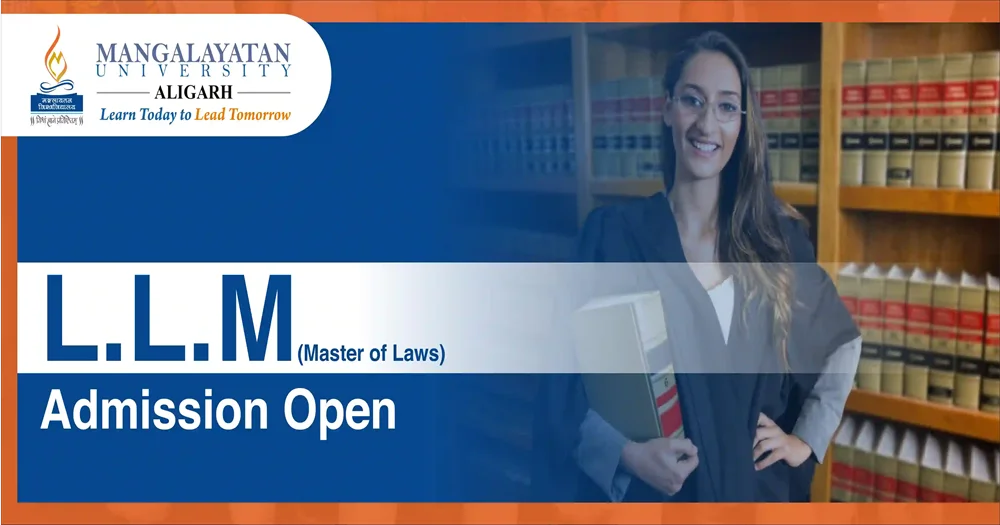Master of Law (LL.M) Course Admission 2025 - Top College in Aligarh, Uttar Pradesh
LLM is a postgraduate law degree course. The learners get in-depth knowledge of a specific field of law through intensive research. The course offers various specializations.
Some specializations are Constitutional, Corporate Intellectual Property, International, Criminal, Environmental, Human Rights, Tax, Cyber, and Family Laws. The curriculum includes core subjects like Constitutional and Administrative Law, Indian Legal System and Legal Methods, Legal Research and Writing, and subjects related to the abovementioned specializations. LLM is also offered in Executive mode, generally offered only to working professionals. The course helps the learners to gain specialized knowledge in various legal areas.
LLM Admission Eligibility Criteria (1 year & 2 years)
- The candidates must have completed their graduation in law.
- The candidates need to achieve a minimum of 50% marks in graduation.
Master of Law (LLM Course) Duration (One year & Two years):
LLM is 1 year and 2 years duration course. The course curriculum is designed in such a way that it is divided into semesters. The learners get in-depth knowledge of a specific field of law through intensive research.
- Submission of dissertations at the end of the final semester.
- The course is conducted through lectures, seminars, tutorials, and practical exercises.
- Learners engage in independent study and research.
- Some programs offer opportunities for practical training through internships and clinical legal education programs.
Mangalayatan University Aligarh LLB Course Admission Process
Steps to Follow
Step - 2

Fill Application Form Online
Step - 3

Pay Application Fee
One-Year LLM Course
A one-year LL.M. (Master of Laws) course offers specialized legal education for individuals who already hold a law degree. Here are some common features you might find in such a program:
- Specialization: LL.M. programs often allow students to specialize in a particular area of law such as international law, intellectual property, human rights, corporate law, or environmental law.
- Coursework: Combination of core courses and electives within their chosen specialization and electives allow students to tailor their education to their interests and career goals.
- Practical Experience: Some programs offer opportunities for students to gain practical experience through internships, externships, or clinical placements with law firms, government agencies, or non-profit organizations.
- International Perspective: LL.M. programs often provide exposure to diverse cultural and legal backgrounds, offering valuable insights into global legal issues and perspectives.
LLM 1-Year Course Fee Structure
| Fee Type |
Year 1 |
Total |
| Tuition Fee (INR) |
90,000 |
90,000 |
| Registration Fees One Time (INR) |
500 |
500 |
| Total Fees |
90,500 |
90,500 |
Note* - Per Semester Examination Fees - Rs.3500/ & Security Deposit (One time paid) - Rs.5000/ (Refundable)
Two-Year LLM Course
Two years of LLM is likely to be preferred by universities. However, it has fewer specialization options.
- Two year LLM Course is more elaborate and enables the student to learn detailed curriculum .
- The LLM program is also supported by practical training and hands-on experience.
LLM 2-Year Course Fee Structure
| Fee Type |
Year 1 |
Year 2 |
Total |
| Tuition Fee (INR) |
70,000 |
70,000 |
1,40,000 |
| Registration Fees One Time (INR) |
500 |
- |
500 |
| Total Fees |
70,500 |
70,000 |
1,40,500 |
Note* - Per Semester Examination Fees - Rs.3500/ & Security Deposit (One time paid) - Rs.5000/ (Refundable)
Job Profiles after Completing A LLM Degree Course :
An LLM scope can be extensive and diverse, offering numerous opportunities in various sectors. Some of the job roles which learners can pursue after completion of the course:
- Legal Counsel
- Corporate Lawyer
- Litigation Lawyer
- Legal Advisor
- Legal Researcher
- Human Rights Advocate
- Legal Consultant



















